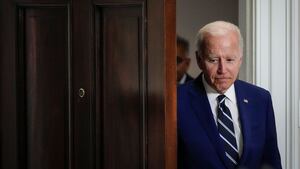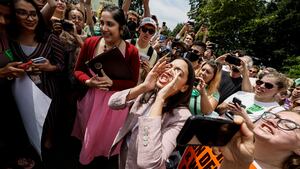Should public officials—even the ones you really don’t like—be allowed to have a moment’s peace in their personal lives?
During his appearance on Fox News Sunday this past weekend, Transportation Secretary Pete Buttigieg dismissed concerns over people protesting Supreme Court Justice Brett Kavanaugh from outside of Morton’s steakhouse in Washington, D.C., last week.
By Buttigieg’s telling, this was no big deal. Just normal citizens who want to “exercise their First Amendment rights.”
Buttigieg is a master at making the radical sound reasonable, and this situation was no exception. What kind of monster could be against citizens who are “peacefully protesting” their rights being “taken away”? Here, though, some context is needed to see the full picture.
It’s not like citizens organically saw Kavanaugh walk into a restaurant and then spontaneously decided to protest him. A lefty group called Shutdown DC appears to have been involved, and the group sent out a Twitter message on the heels of the Morton’s protest, asking service industry workers to tip them off as to where conservative Supreme Court justices are dining, in exchange for up to $250 in payment. (For context pertaining to the times in which we live, just one month ago, a man traveled to Kavanaugh’s house with a plan to assassinate the justice.)
Buttigieg began his Fox News comments with the caveat that public officials “should always be free from violence, harassment, and intimidation,” and yet, the protests outside of Morton’s were cheered on by prominent online activists with sentiments such as “I hope they never know peace” and “no justice, no peace.”
Does attempting to deprive a public official of any semblance of peace in their private lives constitute harassment and intimidation? Not in Mayor Pete’s world.
Of course, the intimidation wasn’t directed solely at Kavanaugh or the other conservative justices who voted to overturn Roe v. Wade. The protesters reportedly “demanded that the [restaurant] manager kick Kavanaugh out.” And after Morton’s refused to cave to the mob, the chain’s restaurants were inundated with phony reservations and phone calls.
But no intimidation here—right, Mayor Pete?
In his brief comments on Fox News, Buttigieg explained that “these protesters are upset because a right…was taken away.” But surely people on the right feel the same way from time to time, which doesn’t make it any more of a civilized tactic.
By going out of his way to reiterate the protesters’ grievances, Buttigieg betrays that his assessment of the protesters’ tactics was at least partially premised on the righteousness of the cause. This is consistent with a worldview that considers offensive speech to be literal violence—while simultaneously excusing rioting as not violence, but legitimate speech.
This makes me wonder whether Buttigieg would be such a free speech absolutist if the shoe were on the other foot. During the interview, Buttigieg claimed that he would be OK if it were, adding, “I can’t even tell you the number of spaces, venues, and scenarios where I’ve been protested.”
Let’s take him at his word. But how about everyone else on the left? Let’s say the Oath Keepers started following Justice Sonia Sotomayor around, paying bounties to restaurant employees who rat on her whereabouts, and “encouraging” restaurant managers to kick her out of places. Sounds pretty creepy, right? How would the media portray that? How would progressives feel about these citizens exercising their rights?
Or take Rep. Alexandria Ocasio-Cortez, who mocked Kavanaugh for having to leave the restaurant “before his soufflé.” Let’s imagine if the Proud Boys started surveilling her. I’m pretty sure Mayor Pete would be calling this form of First Amendment expression by its other name: stalking.
One of Buttigieg's undeniable political talents is his ability to take a radical position and frame it as something so wholesome and anodyne that it might be mistaken for a plot point from Leave It To Beaver. It’s an auspicious skill in politics, but it’s really a form of gaslighting.
By ignoring the context and endorsing the ideological perspectives of the protesters, Buttigieg seems to take the high road and talk about how people have the legal right to peacefully protest in public places.
But he evades the moral question: Should we be doing this? Is this form of protest dangerous, particularly during this time of heightened political violence? Is this healthy for democracy? Should political leaders be encouraging or excusing it? A real leader would ask these questions and be prepared to not find the answers as politically expedient as he hoped.








